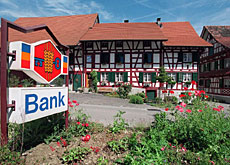Swiss high street banks still money-spinners

The good old high street bank is far from dead – there is still plenty of money to be made from retail banking despite the internet revolution.
But branch offices will need to work hard on improving customer service levels, not least by introducing more flexible opening hours.
Those are two of the main findings of a new Europe-wide study of the retail-banking sector by consultants Booz Allen Hamilton (BAH).
It also found that Swiss banks were particularly well positioned for the future – and still come top in terms of customer satisfaction compared with their European counterparts.
“The Renaissance of Retail Banking” study was based largely on interviews with more than 600 bank customers in six European countries, including 102 in Switzerland.
Company consultants also carried out a so-called “Mystery Shopping” exercise, during which they visited bank branches in all six countries, posing as customers.
The idea was to evaluate quality in four areas: service levels at branch offices, product knowledge, customer orientation and sales orientation.
Faulty perception
Reto Isenegger, co-author and member of the management board of BAH Switzerland, said that despite branch closures and the growing use of e-banking facilities, banks were maintaining a strong and profitable presence in the high street.
“I think the perception of the public that retail banking is no longer a profitable business – at least for the ‘universal’ banks [UBS and Credit Suisse] – is not borne out by the strategies they follow.
“The big Swiss banks have always had a very strong position in the domestic retail market, and they have always been aware of this.”
Isenegger added that retail banking provided a reliable cushion for the banks when there were downturns in other areas of their business.
“More recently, when investment banking has done less well, this has given [banks] earnings stability compared, for instance, with large banks in Germany, where the retail market is more dominated by the co-operative and savings banks.”
Isenegger said Swiss banks came top in all four areas examined, compared with their counterparts in Germany, Denmark, the Netherlands, Britain and Spain.
“Like skiing, banking is part of Switzerland. However, consumers here are also very demanding, and being good in a European ranking does not automatically make you a leading bank in the Swiss market.”
Overall, Swiss banks scored highest on product knowledge, but the study suggested that bank branches are not perceived as “one-stop shops” and staff often fail to identify the full range of customer needs – and hence do not profit from “cross-selling” opportunities.
Open all hours?
The weakest point for all the Swiss banks was branch service levels, particularly the “inflexibility” of opening hours.
Isenegger said young, professionally active people are the most dissatisfied in this respect – precisely the customers that banks should be looking to “lock in” now for profitable life-long business relationships.
“Funnily enough, opening hours was not something we had on the radar screen when we began. But we found that banks like Raiffeisen and the cantonal banks are often more flexible, for instance offering the possibility of meetings on Saturday. The universal banks have to consider how to react to that.”
Cooperation pays
The clear winners of the Swiss survey were the cooperatively run Raiffeisen banks, which also came top for overall quality (breadth plus “pro-activity”) of client consulting.
Credit Suisse came only third in that category, behind the cantonal banks, while UBS finished fourth.
The Raiffeisen and cantonal banks also came top for flexibility of opening hours, with the big banks scoring the lowest marks.
But they made up when it came to product know-how, and Credit Suisse pipped UBS to the post when it came to building long-term customer relationships.
The organisations with the most work to do to catch up with the winners in virtually every category are the regional banks, followed by the other retail banks – Post Finance, Migros Bank and Bank Coop.
“The non-regional banks have changed much more over the years, undertaking major initiatives such as the Raiffeisen banks coming into the towns, upgrading their branches and going into joint ventures,” said Isenegger.
“The cantonal banks have also done a lot to improve their positioning as local players. The regional banks are still quite strong in rural areas, but have not developed in new client acquisitions at the same rate.
swissinfo, Chris Lewis in Zurich
BAH surveyed customer needs in each country, followed by a country-specific exercise to evaluate how well needs are met.
In Switzerland, banks were grouped as: universal, cantonal, regional, other (Post Finance, Migros Bank, Bank Coop).
Main Swiss expectations were: competence (31%), friendliness (16%), flexible opening hours (10%).
The authors think retail banking has a brighter future than many believe – although branch closures and e-commerce have permanently changed the landscape.
The study focused on four areas: service levels, product knowledge, customer orientation and sales orientation.
Swiss banks as a whole came top, despite clear differences between categories.

In compliance with the JTI standards
More: SWI swissinfo.ch certified by the Journalism Trust Initiative


You can find an overview of ongoing debates with our journalists here. Please join us!
If you want to start a conversation about a topic raised in this article or want to report factual errors, email us at english@swissinfo.ch.